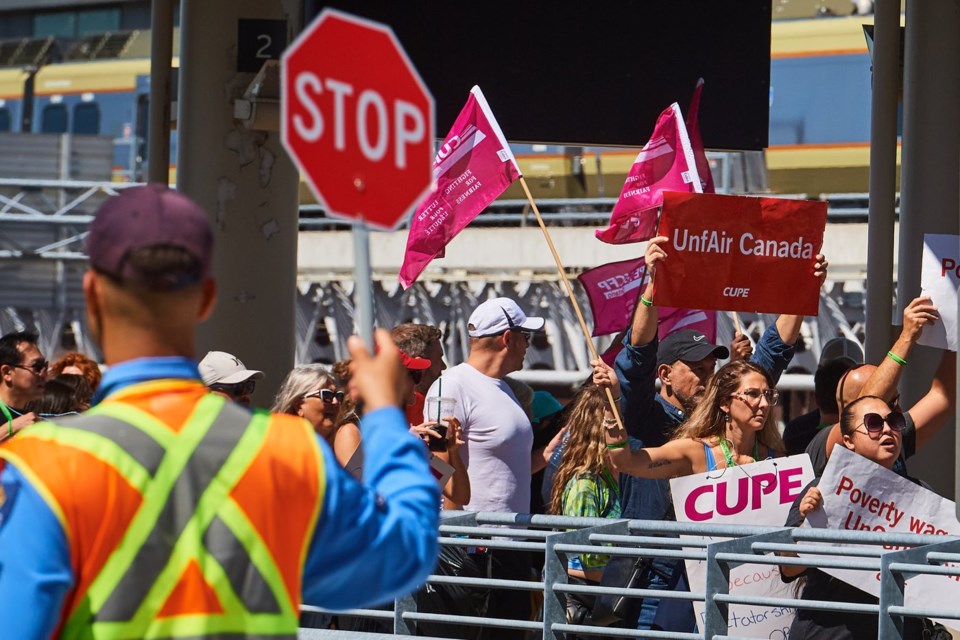Flight attendants' defiance in the face of federal intervention meant to halt a recent strike at Air Canada could set a new precedent for work stoppages, some labour movement-watchers say.
The workers' move disrupted a growing pattern that has been eroding the right to strike in Canada, said Barry Eidlin, an associate professor of sociology at McGill University, referring to the federal Liberal government's repeated use of Section 107 of the Canada Labour Code, a relatively recent mechanism.
The regulation gives the minister power to take actions that "promote conditions favourable to the settlement of industrial disputes," including by referring the matter to the labour board.
But Eidlin called the Liberal government's repeated use of the regulation — including to end separate strikes since 2023 by rail and port workers — a "novel interpretation" of its powers. He noted there are ongoing constitutional challenges of the tool's usage in those cases, which have yet to be decided by the courts.
"There's a valid argument to be made that ... the legal standing of our constitutional right to strike far exceeds this novel interpretation of this obscure part of the Canada Labour Code and so we are within our rights to defy this order because it's not a legitimate order."
More than 10,000 flight attendants went on strike around 1 a.m. on Aug. 16, with the airline locking them out soon after, bringing all Air Canada flights to a halt.
Less than 12 hours into the work stoppage, Jobs Minister Patty Hajdu invoked Section 107 to request the Canadian Industrial Relations Board end the strike and send the parties to binding arbitration. The board ordered flight attendants to return to work the following day.
But the order was defied by union officials, leading the board to declare the strike unlawful and order them to publicly tell members to stand down. Workers remained on the picket lines until the two sides eventually resumed talks and came to a tentative deal Aug. 19.
Eidlin said the chain of events could not only embolden unions in future work stoppages, but also make the government think twice about invoking Section 107 in the first place.
"It certainly opens the gates," he said.
"I think that it will show other unions that they don't just have to take the order of the industrial relations board to go back to work at face value."
While the outcome of the Air Canada work stoppage has likely "put a damper" on Section 107, Brock University labour professor Larry Savage said that doesn't mean the government is no longer going to intervene in labour disputes.
"That's wishful thinking," he said, adding that Ottawa could simply pivot to other tools available when seeking to put an end to future strikes.
"Section 107 may fall into disuse as a result of the Air Canada strike, but it's important to remember that governments can always revert to passing traditional back-to-work legislation."
Savage said the Liberals have been using Section 107 as a "workaround" to avoid Parliamentary debate in the House of Commons, which is a necessary step when passing back-to-work legislation to end a strike.
He said that while the circumstances of each strike or lockout are different, courts have upheld the use of back-to-work legislation in recent years, which could make it a viable option for the government.
He also predicted a "strong counteroffensive" from employers in order to tip the scales back in their favour. That could mean advocating for certain jobs to be deemed essential services so workers can't legally strike, or calling for the repeal of the federal government's legislation banning replacement workers.
"Air Canada's management bungled this labour dispute very badly ... but I think that employers will instinctively still try to rely on government to help them out when it comes to labour relations," Savage said.
He said the flight attendants were able to use high levels of public support for their bargaining positions to their advantage as they held out on picket lines defying the federal order.
That afforded the union more strategic leverage to pressure the airline back to the bargaining table as flight cancellations continued to pile up.
"It was a calculated risk in the end, but it was a risk that paid off," said Savage.
The flight attendant saga isn't yet over the finish line, as the proposed deal must be ratified.
Members of the Air Canada component of the Canadian Union of Public Employees began voting Wednesday on the tentative deal reached with the airline. The voting period will conclude on Sept. 6.
If the deal is not ratified by union membership, CUPE said all terms excluding those surrounding wages would still form part of a new collective agreement with Air Canada. That includes terms setting out rules for ground pay, pensions and retirement bridging, health benefits, prone rest and vacation.
The wages portion of the agreement would then proceed to arbitration, where a third-party arbitrator would make a final decision.
Eidlin said the company's concessions prove that despite all the tools in employers' arsenal to quash labour unrest, they do have to negotiate.
"It shows employers that they don't have a get-out-of-jail-free card."
This report by The Canadian Press was first published Aug. 29, 2025.
Companies in this story: (TSX:AC)
Sammy Hudes, The Canadian Press



